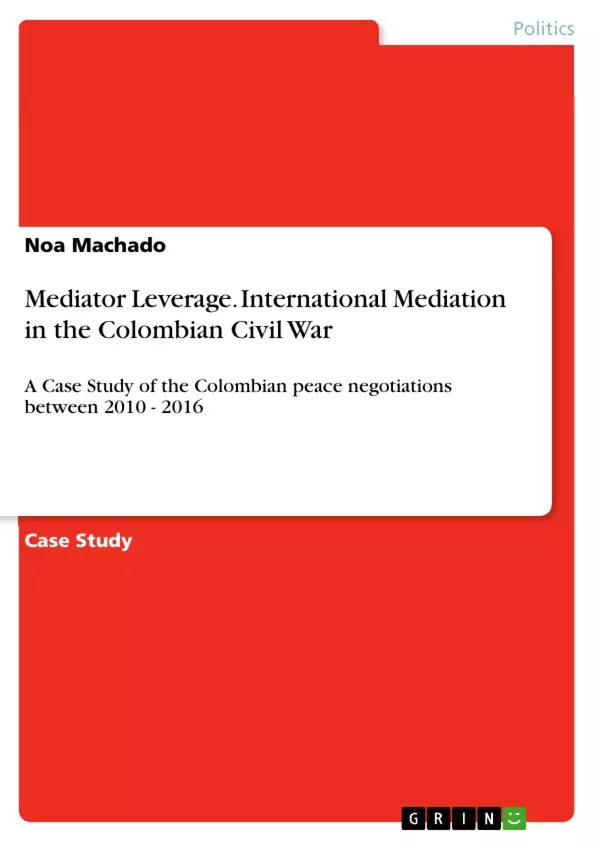The aim of this work is to elaborate the meaning of credibility, as defined by Lindsay Reid, in the Colombian peace negotiations and to shed light on the role of the two involved guarantor countries and mediators Cuba and Norway.
Therefore, it is important to look at whether and how the mediators fulfill the characteristics for generating credibility leverage, in order to be able to answer the question: In what manner does the credibility leverage of mediators manifest as the Colombian peace process unfolds?
For this purpose, sources on mediation and mediator leverage as well as studies reviews on peace negotiations in Colombia will be referenced.
It is particularly important to emphasize that this term paper focuses on the process of mediation itself, detached from making judgements about its ultimate success in creating peace in Colombia.
Inhaltsverzeichnis (Table of Contents)
- Introduction
- Reasearch Question
- Literature review
- Mediation: Torwarts an Definition
- Mediator Leverage: Concept and Components
- Theoretical Argument
- Methodology
- Case Selection
- The Colombian Civil war: Historical Overview and previous peace efforts
- Actors and trust dynamics in the Colombian Peace Process
- Analysis of the impact of mediator Leverage on the Colombian Peace Process
- Conclusion
- Limitations and disscussion
Zielsetzung und Themenschwerpunkte (Objectives and Key Themes)
This work aims to explore the concept of mediator credibility, as defined by Lindsay Reid, within the context of the Colombian peace negotiations. It will analyze the role of Cuba and Norway as guarantor countries and mediators, examining whether and how they fulfilled the characteristics of credibility leverage. Ultimately, the study seeks to answer the question of how credibility leverage manifested itself during the Colombian peace process.
- Mediator credibility and its impact on peace negotiations
- The role of guarantor countries in facilitating peace processes
- The Colombian peace process as a case study for examining mediator leverage
- The dynamics of trust and mistrust between conflict parties
- The influence of mediator strategies on conflict resolution
Zusammenfassung der Kapitel (Chapter Summaries)
The introduction sets the stage by highlighting the increasing complexity of contemporary conflicts and the growing importance of mediation. It then introduces the research question, focusing on the role of mediator credibility in the Colombian peace negotiations. The literature review provides an overview of existing research on mediation and mediator leverage, emphasizing the concept of credibility leverage as defined by Lindsay Reid. The methodology section outlines the case selection, focusing on the Colombian civil war as a relevant case study. The chapter on the historical overview of the Colombian civil war explores the context of the conflict and previous peace efforts. The following chapter delves into the actors and trust dynamics involved in the Colombian peace process, setting the stage for the analysis of mediator leverage. The final chapter analyzes the impact of mediator leverage on the Colombian peace process, examining the strategies and qualities of Cuba and Norway as mediators.
Schlüsselwörter (Keywords)
The key concepts explored in this work include mediator credibility, mediator leverage, peace negotiations, civil war, trust dynamics, guarantor countries, the Colombian peace process, Cuba, and Norway. This study focuses on the role of mediator credibility in facilitating peace agreements and its impact on the dynamics of conflict resolution.
- Quote paper
- Noa Machado (Author), 2023, Mediator Leverage. International Mediation in the Colombian Civil War, Munich, GRIN Verlag, https://www.hausarbeiten.de/document/1397429


